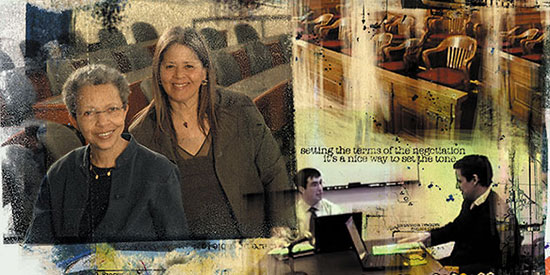Learning the craft and building a foundation for legal practice
When University Professor Anthony Amsterdam conceived of Lawyering in the late 1970s, he was convinced that doctrinal analysis was just one of the many skills needed to be an effective lawyer. Through role-playing, written exercises, teamwork and feedback, the lawyering program lays a foundation for lawyers to understand and fulfill their complex role in society. “Our mission is to teach students what it means to practice law and to think critically,” says Peggy Cooper Davis, the John S. R. Shad Professor of Lawyering and Ethics, who has directed the program since 1999.
Teaching such fundamentals requires a clear comprehension of legal practice. To explore and develop a conceptual framework for what lawyering is, Davis and Amsterdam began the Lawyering Theory Colloquium in 1991, in which faculty and upper-level law students gather ideas from many disciplines, such as psychology, rhetoric, anthropology and performance studies. Teaching units of the colloquium, experts such as cognitive psychologist Jerome Bruner can explore the effect of narrative on persuasion and decision-making, and Tony-winning playwright Anna Deveare Smith can hone techniques of interviewing and representation. “The development of the program during the past two decades is clear evidence that the faculty is always pushing to expand the meaning of experiential learning for everyone,” says Leonard Noisette ’84, executive director of the Neighborhood Defender Service of Harlem, who role-plays a judge for a Lawyering exercise on litigation.

The mandatory, year-long Lawyering course encompasses seven exercises that address the multiple intelligences required in lawyering and the multiple dimensions of the work. The Lawyering faculty meet throughout the month of June to analyze the prior year’s curriculum, hone their teaching methods and redesign exercises to make sure they will teach effectively the range of lawyering skills the colloquium has helped identify. For example, the exercise in Negotiation and Transactional Lawyering takes students through a hypothetical transaction involving NYU, which holds the patent on a breakthrough HIV/AIDS drug, and Aderson, a fictional pharmaceutical company that wants to license it. The students are assigned to represent NYU or Aderson and given different sets of facts about financial, regulatory and other issues. They are then tasked with striking a deal. “Some students find dealing with numbers scary,” says former Associate Director of Lawyering Jacqueline Jones-Peace ’95, who was once an investment analyst. “This simulation should help them when they encounter negotiations requiring mathematical skills in the real world.”
The exercise requires the students to research, interview, negotiate and then engage in a comprehensive critique. Interpersonal and mathematical skills, the students learn, are equally important. The economic value of the deal, its public relations implications, its social effects and its meaning to key personnel at both Aderson and NYU all receive careful attention in a fully realized bargaining plan. As one student wrote in an anonymous course evaluation: “Nothing I could have read about mediation or negotiation or interviewing a client could have taught me some of the lessons I learned from actually practicing.”
The real test of Lawyering’s success is when students apply their skills outside the classroom. Morgan Bottner ’07 clerked one summer for the Environmental Enforcement Division of the U.S. Department of Justice. He wrote part of a brief seeking a default judgment against a landowner whose corporation polluted property. “Lawyering was the one class that made me effective at my job,” says Bottner. “I learned to research issues that were new to me and write about them effectively.”